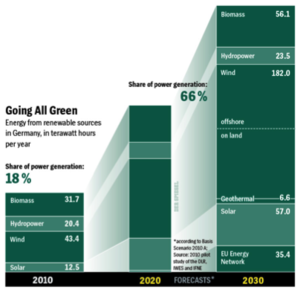Future Now
The IFTF Blog
The Energiewende: Germany’s Energy Transition
Germany’s Energiewende is propelling the shift to a new energy economy. This post is Part 1 of a series on Germany’s energy transformation.
Energiewende, the German word for “energy transformation,” is a term being adopted in China and other places that are following Germany’s lead in its shift away from fossil fuels and nuclear energy. I just spent a week in Berlin with the American Council on Germany (ACG) meeting with thought leaders on climate and energy policy from the government, climate science research, policy think tanks, and other nonprofit organizations. Here, not only is there broad recognition of climate change and the human role in causing it, all public policy is considered in the context of climate change and its growing impacts.
Germany is the 5th largest economy of the world and a manufacturing powerhouse. With its highly skilled workforce, Germany is a leading exporter of machinery, vehicles, chemicals and household appliances. Since the roll out of the Energiewende, the industrial share of Germany’s GDP has not receded but remained at 23%.

According to the OECD, Germany’s renewable energy grew ten times faster than the OECD average from 1990 to 2010. Renewable energy currently accounts for roughly 20% of Germany’s total generation, and the government aims to reach 35% by 2020 and 80% by 2050. The last nuclear plants will be phased out by 2022. The focus is moving away from figuring out how to integrate renewables into the conventional system and toward the reverse. As renewables grow in share, baseload powerplant generation becomes anachronistic. Much development of distribution networks is still needed to better connect generation and industrial demand across Germany and to improve integration with the broader European market.
The energy transformation is driving new economic opportunities. Currently, Germany’s renewable energy industry is valued at $250 billions and accounts for 380,000 workers. That’s a larger workforce than Germany’s auto industry!
 Germany’s big industry does not dispute climate science. Nor does it try to stop the country’s progress in reducing greenhouse gas emissions and its dependence on fossil fuels. Instead, German industry demands clear timelines so that they can plan. The government is supporting industry’s transition such as through lowered electricity rates, financing, as well as support with electricity management systems and optimization of energy intensive processes.
Germany’s big industry does not dispute climate science. Nor does it try to stop the country’s progress in reducing greenhouse gas emissions and its dependence on fossil fuels. Instead, German industry demands clear timelines so that they can plan. The government is supporting industry’s transition such as through lowered electricity rates, financing, as well as support with electricity management systems and optimization of energy intensive processes.
Proactively driving transformation translates into new competitive advantage in a changing context. German carmakers are driving change in their industry and positioning themselves for competitive strength in the coming decades. They’re shifting toward electric vehicles and new business models that integrate with related infrastructure and utilities. They’re even taking up care sharing models in urban markets. The State of Baden-Württemberg, home of Daimler and Porsche, is now led by the Green Party. Several of its major cities such as Stuttgart are also in the hands of the Green Party.
Germany’s pragmatism and vision reflected in the Energiewende is also influencing their foreign policy. For the German Foreign Ministry, climate security is a nontraditional security threat. As a risk multiplier, climate change can make existing conflicts worse, such as those over access to water and energy. The pragmatic approach shared by Germany’s major political parties is to develop greater mutual dependency. Given the global disruptions that extreme weather and receding fresh water resources will cause, the German foreign ministry is negotiating with other foreign offices around the world and supporting adaptation efforts of countries in some of the most vulnerable parts of the world.
As the ACG frames it, "Germany has made the decision to put climate/energy priorities at the top of its economic and foreign policy agendas. This is not only a matter of German self-interest; it is because scarce energy resources around the world are a source of conflict."



